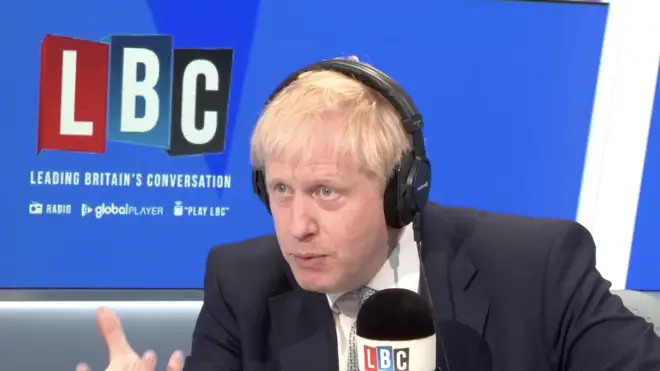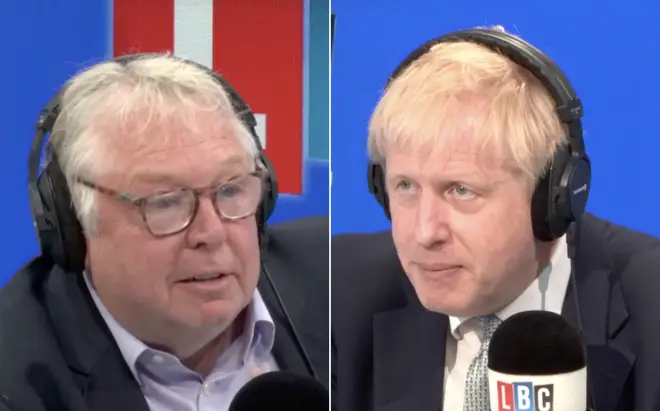
Paul Brand 1pm - 4pm
25 June 2019, 12:46 | Updated: 25 June 2019, 12:51
The Conservative leadership candidate tells LBC the Governor of the Bank of England is wrong to suggest GATT24 is "not an option" for post-Brexit trade.
Boris Johnson, who has argued that GATT 24 can be used in the interim until a free trade deal is reached with the EU, said Bank of England Governor Mark Carney was wrong to suggest it was "not an option".
Mr Carney said GATT 24 could only be used if the UK and European Union had a withdrawal agreement in place as under WTO regulations, leaving without a deal would mean "automatically" moving to tariffs.
But when pressed on the issue by Nick Ferrari, Boris Johnson said the article did not have to 'go away' if the UK 'walks away' from a deal.
"It is vital as a country that we get ready to come out without an agreement if we must," Mr Johnson said.
Nick said: "But GATT goes against the UK if we walk away."
Mr Johnson replied: "It doesn't have to."
- Boris Johnson Phone-In Interview: 10 Things We Learnt From His Live LBC Show

Nick asked: "So is Mark Carney wrong?"
Mr Johnson replied: "He's right in the sense GATT Article 24 paragraph 5b makes it perfectly clear that two countries that are in the process of beginning a free trade agreement may protract their existing arrangements until such time as they've completed the new free trade agreement.
"And that's a hopeful prospect, that is the way forward.
"Where Mark is right, is saying that implies mutuality. There has to be an agreement on both sides.
"But he's wrong in thinking it's not an option. It certainly is an option, people are wrong if they say it's not an option."

Boris Johnson cited a specific paragraph that made "perfectly clear" that two countries could protract their existing arrangements until they've completed their new free trade agreement.
It says tariffs and regulations "shall not be higher or more restrictive" than the existing agreement "prior to the formation of the free-trade area".
In full, paragraph 5 of GATT Article 24 says:
Accordingly, the provisions of this Agreement shall not prevent, as between the territories of contracting parties, the formation of a customs union or of a free-trade area or the adoption of an interim agreement necessary for the formation of a customs union or of a free-trade area; Provided that:
(a) with respect to a customs union, or an interim agreement leading to a formation of a customs union, the duties and other regulations of commerce imposed at the institution of any such union or interim agreement in respect of trade with contracting parties not parties to such union or agreement shall not on the whole be higher or more restrictive than the general incidence of the duties and regulations of commerce applicable in the constituent territories prior to the formation of such union or the adoption of such interim agreement, as the case may be;
(b) with respect to a free-trade area, or an interim agreement leading to the formation of a free-trade area, the duties and other regulations of commerce maintained in each of the constituent territories and applicable at the formation of such free–trade area or the adoption of such interim agreement to the trade of contracting parties not included in such area or not parties to such agreement shall not be higher or more restrictive than the corresponding duties and other regulations of commerce existing in the same constituent territories prior to the formation of the free-trade area, or interim agreement as the case may be; and
(c) any interim agreement referred to in subparagraphs (a) and (b) shall include a plan and schedule for the formation of such a customs union or of such a free-trade area within a reasonable length of time.

